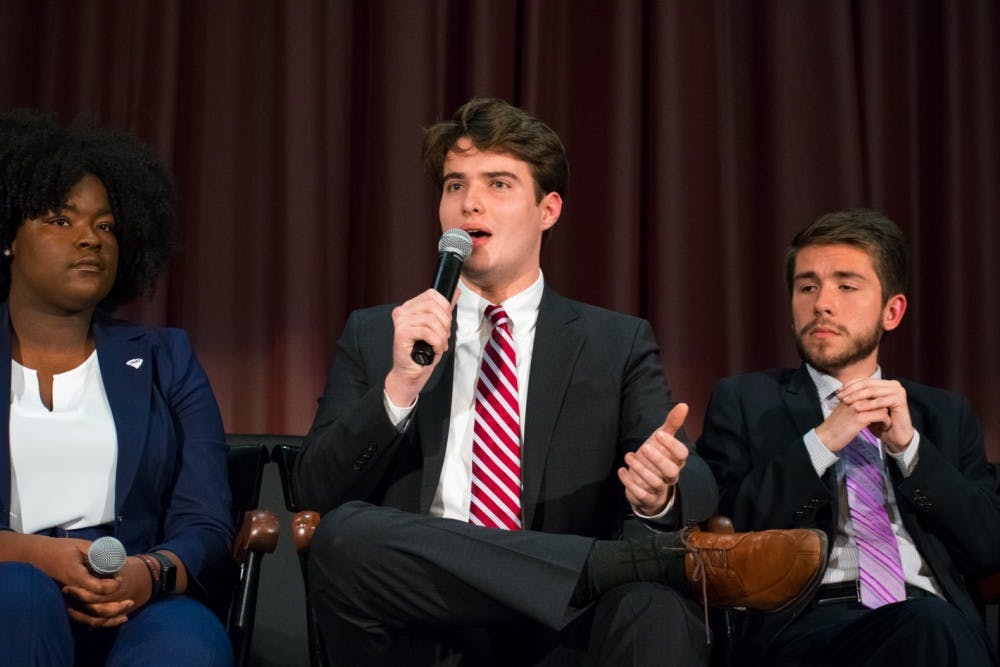Candidates had the opportunity to explain their platforms and advocate for their campaigns Tuesday night at the Student Government executive candidate debate. The debate highlighted diverse candidate viewpoints on bridging relationships between student government and the general student body.
Each candidate was given the chance to give an opening statement, and many candidates used this time to describe their vision for USC and to explain why students should vote for them. Adger Drummond, a candidate for student body treasurer, recognized the role that Student Government executives play on campus.
"I want us to also understand that we are in a very unique position," Drummond said. "While we have the opportunity to excel ourselves through student government, we're also given the ability to help our constituents excel in whatever it is they want to do,."
Candidates often discussed the best way to serve USC students, with many focusing on the issue of transparency and open communication in their offices, including Kate Lewis, a candidate for student body treasurer.
"This is an issue in the treasurer's office, and this is something I am incorporating into my platform," Lewis said. "Not everybody on this campus even knows what Student Government does."
On the issue of transparency, Drummond proposed to have the student government's budget available on Garnet Gate to allow all students to see how much is left to spend and where money has been allocated.
Each candidate proposed a different approach to meeting and interacting with students, often discussing ideals of availability of approachability.
"You've got to be approachable," Luke Rankin, candidate for student body president, said. "You've got to be able to talk to every kind of student, no matter their background."
One candidate in particular, student body presidential hopeful Jacob Thompson, has demonstrated a grassroots approach in reaching out to the student body. Though Thompson has never held a position in Student Government, he prides himself in his ability to reach out to students authentically.
"One thing I've done since I was a freshman that I'm really proud to say is I tell people 'good morning.' I tell people 'good afternoon' and 'good evening' every time I see them, pretty much every person I pass," Thompson said. "You never know what kind of small thing like that will make such a positive difference in someone's day."
Students reacted to Thompson's demeanor, with many in the audience clapping and laughing at his responses. Ward Jolles, a second-year broadcast journalism and geography student, said he liked Thompson's differing views.
"I really liked Jacob Thompson, the underdog who is running for president," Jolles said. "He was very, very well spoken for never have running for anything in his entire life. I think he has a really good vision for Carolina."
Praniti Kudre, a second-year psychology and math student, said she did not like Thompson's approach to candidacy.
"I don't think he was prepared at all," Kudre said. "I don't know why he's running. I feel like there should be more of a screening process or something."
Although candidates spoke on their outreach with USC students, some students in attendance said they had little knowledge of Student Government events and initiatives.
Kudre said that she wanted Student Government to advertise more for its events, having only found out about the debate from a friend. While discussing the turnout of the debate, she said she was disappointed.
"I thought it was pretty decent, but I think that most people are already affiliated with the campaign, which is kind of disappointing," she said. "Because it's student government, I feel like more people from the general population should be involved, and not just people that are already affiliated with campaigns, since this affects all of us."
Madison Northshield, a third-year chemical engineering student, said she observed many attendees associated with campaign platforms.
"I don't know a lot about what's going on here, but I assume that most people are from campaigns," Northshield said.
The conclusion of the debate marks the beginning of hard campaigning for executive hopefuls. Elections will be held over a two-day period on Feb. 26 and Feb. 27.

